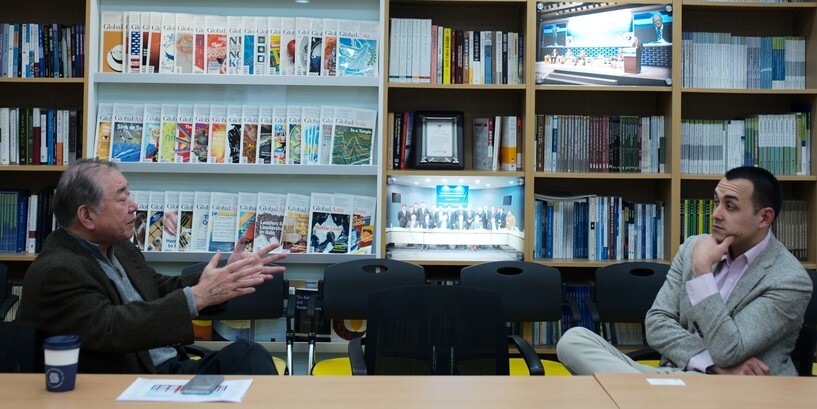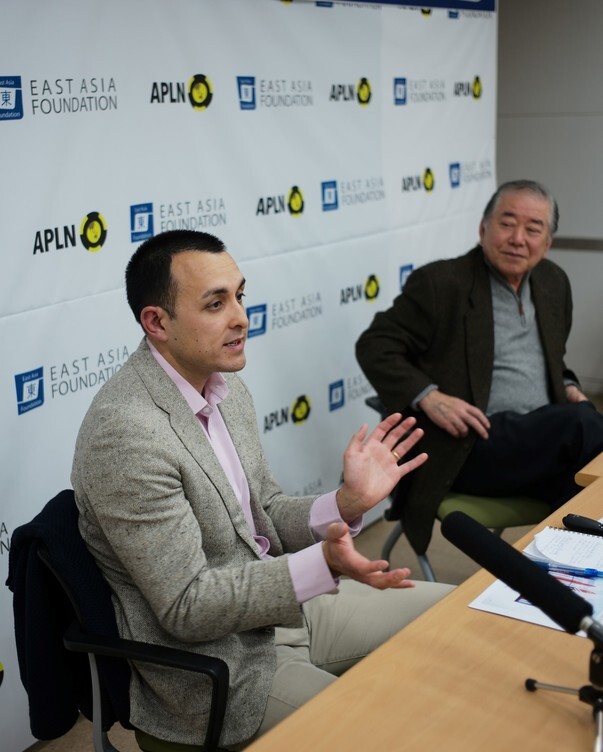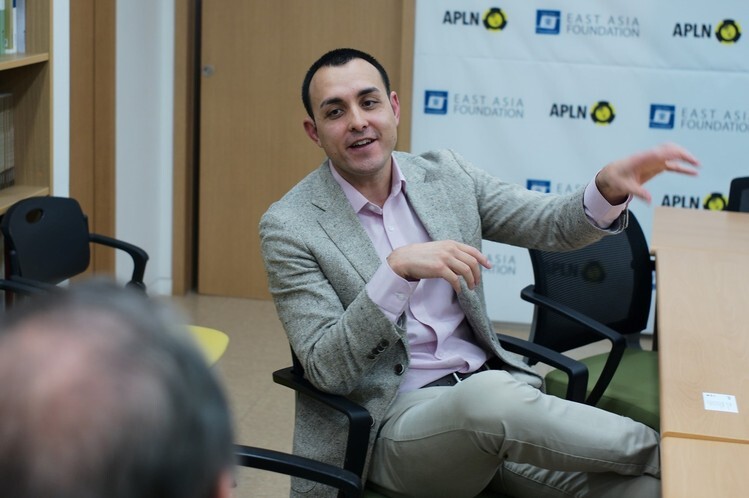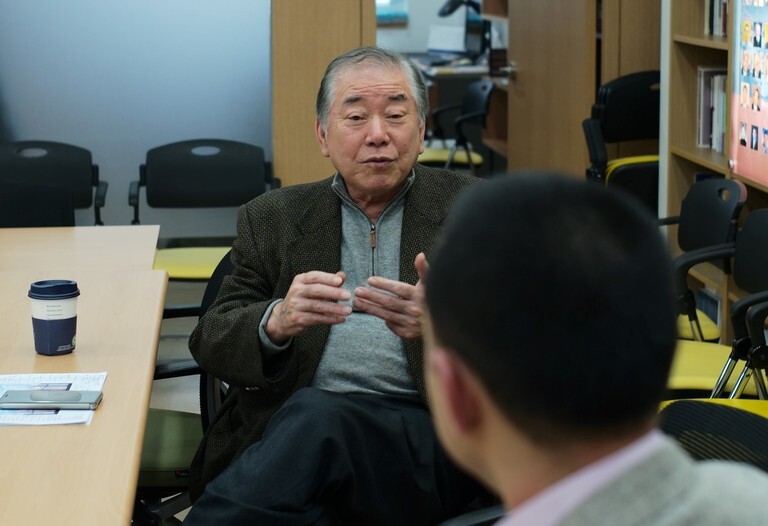hankyoreh
Links to other country sites 다른 나라 사이트 링크
[Interview] How the US’ North Korea policy has failed over the last 30 years

“The US’ North Korea policies over the past 30 years have been a failure. When you don’t learn anything from your failures, the tragedies repeat themselves. To address the North Korean nuclear crisis we are facing and reduce the threat of war, we need to find a way to shift toward an arms control paradigm.” -- Van Jackson, senior research fellow at the Center for a New American Security (CNAS) and professor at the Victoria University of Wellington
“In explaining the structure of scientific revolutions, Thomas Kuhn argued that when ongoing issues and crises cannot be resolved through the existing paradigm, a new paradigm emerges to resolve them. The ‘denuclearization paradigm’ of the past 30 years has brought on the nuclear crisis. An environment has taken shape where a paradigm shift can occur.” -- Moon Chung-in, South Korean special presidential advisor for unification, foreign affairs and national security
Professor Van Jackson told Moon Chung-in that the “key is going to be how the US can show North Korea that it is not ‘hostile.’” He was talking about negotiations between Pyongyang and Washington, which are currently threatened with failure. According to Jackson, the US’ policies toward North Korea since the end of the Cold War have not only failed to prevent the North’s nuclear development but effectively left the North to advance its nuclear weapons. The last 30 years of North Korea policy, he concluded, have been “a failure.”
US needs to prove to N. Korea it isn’t hostileJackson is a Democratic Party-affiliated defense and security expert who served as a strategist and policy adviser in the Office of the Secretary of Defense (OSD) between 2009 and 2014 under the Barack Obama administration. According to him, the US needs to take action on its own to prove that it isn’t “hostile” by 1) suspending its use of the term “denuclearization,” 2) expressing its aims of achieving a “stable coexistence” with North Korea, 3) institutionalizing a strategic security dialogue framework with North Korea, 4) issuing an executive order barring nuclear deployment, and 5) declaring an end to the Korean War.
Jackson stressed that this approach is “by no means a concession, since it accords with the US’ interests as well,” saying the measures would be aimed at “increasing nuclear security.” He also proposed a negotiation initiative for after the independent US measures, which would consist of two stages: a first stage involving a freeze, a preliminary ban on tactical nuclear weapons, and suspending North Korean missile system operations, and a second stage involving a “nuclear-free ocean” initiative, the initiation of weapon withdrawals, and nuclear reporting.
He also proposed five “incentive” approaches (as opposed to unilateral measures) to be used in negotiations with North Korea: 1) a peace regime process, 2) gradual reductions in US Forces Korea troop numbers, 3) a cooperative threat reduction (CTR) program fund, 4) loosening of snapback sanctions, and 5) the creation of a working group for sanctions removal.

A “snapback” system is one in which sanctions are loosened or removed, but return to place in the event of an agreement violation by North Korea. North Korean leader Kim Jong-un and US President Donald Trump discussed this at their second summit in Hanoi, but failed to reach a final agreement. The CTR program proposal would involve applying the same kind of financial and technical support to North Korea that was provided by the US and other members of the international community for the dismantling of weapons and re-employment of nuclear scientists in the former Soviet Union. The proposal for USFK [US Forces Korea] troop reductions is especially unconventional, as the possibility is rarely broached by US security experts.
Jackson predicted the USFK reductions and snap-back system would be regarded as especially worthy proposals by the North. He also anticipated the costs for the US would be average to low -- giving the proposal more bang for the proverbial buck.
Moon Chung-in predicted Jackson’s proposal would be “taken by North Korea as a highly noteworthy signal showing that the US is serious about negotiations and is not hostile.”
Jackson’s proposal is rooted in an understanding that pressure to denuclearize is seen by North Korea as a demand for it to unilaterally lay down its arms. He referred to his set of proposals as an “arms control paradigm” to distinguish it from the previous “denuclearization paradigm.” On Nov. 21, Jackson gave a talk about his proposals at the East Asia Foundation, after which he spoke to Moon in a conversation lasting over an hour.
GSOMIA benefits US security but isn’t essential for its regional security-Moon Chung-in: I’d like to ask your views on current issues. Is the [recently controversial] South Korea-Japan General Security of Military Agreement [GSOMIA] really so crucial to the US’ security interests?
Van Jackson: It is beneficial [to US security], but GSOMIA isn’t essential for the US’ regional security at the present time. Most of the people in the US Department really want to link up the alliances. The idea is to make it so that the US doesn’t have to be an essential presence for its allies at every moment. So it wants [the agreement] to remain in place in terms of its support for South Korea-Japan relations and GSOMIA, but the decision is South Korea’s to make.
Moon: There are reports that the US is demanding US$5 billion in the latest defense cost-sharing negotiations. In other words, they’re asking for US$5 billion even though the cumulative total of leftover defense cost shares stands at nearly US$1 billion.
Jackson: Apparently, they’re demanding costs for activities and military capabilities outside of South Korea, which is obviously ridiculous. This is not supported by alliance experts, particularly Asian and South Korean experts. The US officials have been working backwards to design something to justify the figure of “US$5 billion” that Trump has been emphasizing.
Moon: There have also been reports that it might reduce USFK troops if South Korea doesn’t meet its expectations. USFK reductions were also part of the negotiation incentives that you mentioned.
Jackson: The US needs to modernize its USFK military posture in South Korea while acknowledging that North Korea is a de facto nuclear power. It is logically impossible to expect some kind of “tripwire” effect with a country that possesses nuclear capabilities. The idea behind the tripwire theory is that if USFK comes under attack, the US will send in around 300,000 to 400,000 troops by way of Japan and Busan. But consider who would ultimately face a nuclear attack if we started sending troops to oppose nuclear capabilities. Japan and Busan would immediately come under attack. You can’t oppose a nuclear attack with a conventional combat posture.

Paradigm shift from “denuclearization” to “arms control”
Moon: In your presentation [before the conversation], you emphasized the need for a “paradigm shift” in North Korea policy. With the current climate dominated by a “denuclearization paradigm,” you said we should be adopting a new “arms control paradigm.”
Jackson: Fundamentally, denuclearization justifies the use of “maximum pressure,” threats, and coercion against North Korea. Ironically, it’s more dangerous, since the US is taking unwise risks. If the US decides that its negotiations with North Korea are going to be a process of reaching some form of agreement where North Korea is unilaterally reducing its nuclear capabilities, North Korea will never go along with that. You need a specific kind of situation in place before North Korea will decide on its own to check and control its nuclear weapons and halt production before ultimately eliminating some of its nuclear capabilities.
Moon: What are the pre-emptive, independent actions that you said would be needed from the US for that kind of situation to take shape?
Jackson: First, they need to stop talking about “denuclearization.” Denuclearization is synonymous with unilateral North Korean disarmament, and it’s perceived implicitly as a threat by the North. Second, the US needs to declare that it has no intention of invading North Korea and that the two sides can coexist peacefully so long as North Korea does not threaten our alliance. Third, we need more policies for engaging and involving North Korea, such as broadening channels beyond diplomatic authorities to include military ones as well. Fourth and most important, the White House should issue an executive order that prohibits the deployment of nuclear weapons [strategic nuclear assets] in South Korea without presidential approval. The idea would be to send a credible signal that the US is working to keep itself in check -- it's about words and actions to show that it is approaching things differently. Fifth and finally -- and this is a political issue – it needs to declare the Korean War over, separately from any legal procedures.
Implementing verifiable freeze on N. Korea’s nuclear capability
Moon: Trump has already said that the Korean War is over [in a tweet on Apr. 27, 2018]. [laughs] So if the US takes such independent action and North Korea responds positively, what’s the next step?
Jackson: There needs to be a verifiable freeze on North Korea’s nuclear capability.
Moon: But wouldn’t a freeze require a disclosure?
Jackson: That’s right, but that wouldn’t mean submitting a nuclear inventory. We just need a verifiable freeze that presumes that Kim Jong-un’s bathroom, or in other words, private spaces, will be left out. At this point, North Korea would still be the enemy, and enemies have what can be called the right to keep secrets. We should send as many teams as possible to carry out inspections on the ground, but we have to recognize that we’re not going to reach 100%.
Moon: You seem to be talking about a voluntary disclosure through the International Atomic Energy Agency or some other agency rather than a compulsory disclosure.
Jackson: That’s correct. Our goal in the negotiations should be to arrange the most inspections leading to verification.
Moon: What comes after the freeze?
Jackson: Next would be a preliminary ban on tactical nuclear weapons, or low-yield nukes. Since tactical nukes have a rather small nuclear warhead and are limited in their explosive power, they’re actually more likely to be used. That makes them more dangerous. After North Korea freezes its nuclear program, we need to formalize a promise that both sides will keep tactical nukes off the Korean Peninsula [building on the US’ removal of tactical nuclear weapons from the Korean Peninsula in 1991].
Halting N. Korea’s short- and medium-range missile operations
Moon: Your next proposal is that North Korea halt the operation of its missile system.
Jackson: That would mean securing a promise [from North Korea] not to put its missile system on alert, not to deploy its components, and not to put them in the field for use.
Moon: When you say North Korea’s missile system, do you mean both its short- and medium-range missiles and its ICBMs?
Jackson: I’m talking about its short- and medium-range missiles. If we get to the point where North Korea is using its ICBMs, it’s already game over. That’s a card the North isn’t likely to play. The negotiations need to prioritize suppressing the threat of the short-range and medium-range missiles that directly endanger our allies.
Moon: I take it that the first stage of the arms control approach is a preventative, and rather passive, method of stability management. In that case, what’s the next stage?
Jackson: We need to take measures to create a “nuclear-free sea.” That means promising not to deploy nuclear weapons in the waters around the Korean Peninsula.
Moon: For the next stage, you proposed a “rollback.” What would that be?
Jackson: That means reducing the number of nuclear warheads and missiles. Solid-fuel rockets ought to be eliminated first because they can be launched in a surprise attack. Another priority is eliminating the short- and medium-range missiles that threaten allies such as South Korea and Japan. North Korea’s ICBM capability isn’t as advanced as that of its short- and medium-range missiles.
Moon: In the denuclearization paradigm, nuclear disclosure is one of the first things that negotiators demand, but under the arms control approach, you define the nuclear disclosure as the final stage. Why is that?
Jackson: The disclosure is designed to secure transparency. But to achieve transparency, you need trust. For now, at least, the US and North Korea don’t trust each other. They need to build trust first.
Moon: During the [inter-Korean] summit in Pyongyang in September 2018, I met with senior North Korean officials and talked about the issues of denuclearization and disclosure. The North Koreans told me they couldn’t give the US information about their nuclear weapons in the absence of trust. Such a disclosure, they said, would be tantamount to giving [the US] a list of targets to strike. Furthermore, since American intelligence analysts assume that North Korea has between 60 and 65 nuclear devices, they asked whether the US would believe a North Korean disclosure that only listed 30. The negotiations would break down and trust would evaporate. That might end up only aggravating the situation.
Jackson: That’s accurate. The key question is how the US can show it’s not hostile. That can only be shown through words and actions, and it takes time.

Getting away from path dependence and changing course
Moon: Because of path dependence, it might be hard to change the course we’ve been on until now. The US, Japan, and South Korea have continued to stress North Korea’s denuclearization, and their comments suggest that the ultimate goal is CVID [complete, verifiable, and irreversible denuclearization] or FFVD [final and fully verifiable denuclearization].
Jackson: Path dependence has trapped us into making bad choices and has blinkered our mindset about the North. Look at the results of being loyal to CVID or FFVD. North Korea has acquired as many as 60 nuclear weapons, including some capable of striking the American mainland, which it didn’t have 20 years ago.
Moon: President Moon has made it clear he intends to create a peaceful and prosperous Korean Peninsula that is free from the threat of nuclear weapons and the fear of war. I get the feeling that the arms control approach clashes with South Korea’s goals. What should be done about that?
Jackson: President Obama laid out his vision for a world without nuclear weapons during a speech in Cairo. While that’s obviously a future that we should all dream of, allowing the goal of denuclearization to direct our policy has created a crisis and driven us into the trap of maximum pressure. It’s fine to dream of a nuclear-free Korean Peninsula, and that’s something we should long for, but it shouldn’t guide the way we work out policy details. Our vision should be ambitious, but our policies pragmatic.
Maximum pressure only leads to N. Korea escalating tensions
Moon: Maximum pressure is still being taken as gospel in not only the US but also in South Korea and Japan.
Jackson: That’s very risky. The North Korean attacks that we call provocations are a reaction to the overwhelming pressure from the US. It’s characteristic of North Korean strategy that, when we apply maximum pressure, they don’t submit, but rather respond with maximum pressure of their own, creating a crisis situation. That ultimately leads to nuclear tests and missile launches and just increases danger.
Moon: If I may ask a final question, I understand that President Trump brought up the idea of easing sanctions with a snapback provision during his conversation with Kim Jong-un in their second summit in Hanoi this past February. Do you see that as feasible?
Jackson: There’s precedent for that in the Iran nuclear deal. President Trump himself appears interested in relaxing sanctions. The biggest question the US has is what it would get out of relaxing sanctions, but that’s the wrong way to think about it. North Korea already has nuclear weapons. Unfortunately, the US just doesn’t have the upper hand in these negotiations.
By Noh Ji-won, staff reporter, and Lee Je-hun, senior staff writer
Please direct comments or questions to [english@hani.co.kr]

Editorial・opinion
![[Guest essay] The real reason Korea’s new right wants to dub Rhee a founding father [Guest essay] The real reason Korea’s new right wants to dub Rhee a founding father](https://flexible.img.hani.co.kr/flexible/normal/500/300/imgdb/original/2024/0423/8317138574257878.jpg) [Guest essay] The real reason Korea’s new right wants to dub Rhee a founding father
[Guest essay] The real reason Korea’s new right wants to dub Rhee a founding father![[Column] ‘Choson’: Is it time we start referring to N. Korea in its own terms? [Column] ‘Choson’: Is it time we start referring to N. Korea in its own terms?](https://flexible.img.hani.co.kr/flexible/normal/500/300/imgdb/original/2024/0423/3617138579390322.jpg) [Column] ‘Choson’: Is it time we start referring to N. Korea in its own terms?
[Column] ‘Choson’: Is it time we start referring to N. Korea in its own terms?- [Editorial] Japan’s rewriting of history with Korea has gone too far
- [Column] The president’s questionable capacity for dialogue
- [Column] Are chaebol firms just pizza pies for families to divvy up as they please?
- [Column] Has Korea, too, crossed the Rubicon on China?
- [Correspondent’s column] In Japan’s alliance with US, echoes of its past alliances with UK
- [Editorial] Does Yoon think the Korean public is wrong?
- [Editorial] As it bolsters its alliance with US, Japan must be accountable for past
- [Guest essay] Amending the Constitution is Yoon’s key to leaving office in public’s good graces
Most viewed articles
- 1[Guest essay] The real reason Korea’s new right wants to dub Rhee a founding father
- 2Terry Anderson, AP reporter who informed world of massacre in Gwangju, dies at 76
- 3[Column] ‘Choson’: Is it time we start referring to N. Korea in its own terms?
- 4Why Korea shouldn’t welcome Japan’s newly beefed up defense cooperation with US
- 5[Column] The clock is ticking for Korea’s first lady
- 6Opposition calls Yoon’s chief of staff appointment a ‘slap in the face’
- 7New AI-based translation tools make their way into everyday life in Korea
- 8[Editorial] Japan’s rewriting of history with Korea has gone too far
- 9[Reporter’s notebook] Did playing favorites with US, Japan fail to earn Yoon a G7 summit invite?
- 10[Column] The president’s questionable capacity for dialogue